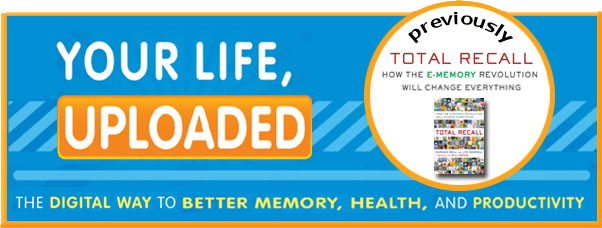Lifelogging Defined: You needn't wear a camera!
 Monday, April 25, 2016 at 5:48PM
Monday, April 25, 2016 at 5:48PM I was recently asked if I was still lifelogging even though I said I was not bothering to wear a camera. Similarly, Chris Anderson made comments that he doesn't lifelog. This prompted some clarification.
LIFELOGGING, the Bell-Gemmell definition is RECORDING (and saving) EVRYTHING.
- Whether something e.g. continuous time lapse photos, voice, video is recorded is: 1. techno economics plus can you do it; 2. a matter of utility (i.e. personal economics is gain worth the pan), and 3. legality. I never felt the SenseCam sequences were particular useful YET and I only used it for about 150 x 5 to 8 hours . Technology i.e. storage has to be essentially zero to want to retain the 20 plus Terabytes that is required for life and this may come when the imager has everything and the software to make it useful to aid memory recall.
- Gemmell’s company, Trov records and maintains a history of all of one’s stuff for insurance, valuation, trading, sale, etc. is a great example that lifelogging is increasing, not decreasing.
- More than ever being able to retrieve everything in life that “matters” is more than ever really critical. One aspect, of lifelogging that arose as we finished what amounted to the building of MyLifeBits, according to Bush’s Memex Blueprint was that personal info became distributed everywhere i.e. FB, Twitter, LinkedIn, bank, broker, etc. In this regard, a UK company, Digi.Me does scrape and maintain all of these data. I am an investor. Also Evernote claims 100 Mega users... and OneNote similarly facilities storing everything
- Finally, I do my best to record every heart beat as I commented earlier
- So bottom line,
- SenseCam streams: don’t bother unless you have nothing in your life, although these tiny worn cameras do record interesting sequences for walks and meetings where you want to remember everyone. Things couldchange if audio recording weren't so illegal and socially unacceptable.
- Your Stuff (use Trov): Yes keep track of valuable stuff cause you are its caretaker;
- All written and read and said communication: by all means including phone calls and general conversation if that becomes legal and socially acceptable;
- Financial, and legal including personal transactions: Absolutely;
- Physical activity and health: yes especially if you have a chronic health condition like everyone in the US AND are able to benefit by it (I'm on my 2nd bypass and 3rd pacemaker.
Here’s a comment I made to clarify issue of lifelogging and recording images.
We defined lifelogging to be the recording of every aspect of one's life including messages, photos, phone calls, and the constant imaging using the SenseCam for the purpose of memory recall, health, education, personal management, etc. Unfortunately, the world focused on lifelogging to mean the constant recording of images--something I haven't found useful to do. Nevertheless I see an eventual path to such a future. Meanwhile the world seems to be taking more pictures than ever, especially of themselves with smartphones. Personally I still never delete anything that comes through my computer and consider this eMemory, the ground truth while using my bioMemory for URL and meta-data to it.
Furthermore, about when our book, Total Recall, came out in 200, the QS -Quantified Self groups started forming and today seems stronger than ever. I tend to define QS is a subset of lifelogging.
 Cameras,
Cameras,  Narrative,
Narrative,  SenseCam in
SenseCam in  Challenges,
Challenges,  Extreme Lifelogging,
Extreme Lifelogging,  Health,
Health,  Vision
Vision 
